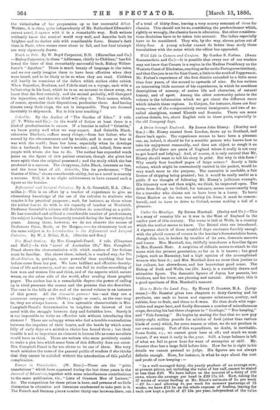Truth in Tale. By W. Boyd Carpenter, D.D. (Macmillan and
Co.) —Bishop Carpenter, in these "Addresses, chiefly to Children," has fol- lowed the lines of that remarkably successful book, Bishop Wilber- force's " Agathos." There is much beauty of language in the tales, and we can easily imagine them to have been effective when they were heard, and to be likely to be so when they are read. Children will hardly be conscious of the defect which strikes older critics. When Superbus, Hesitans, and Fidelis start on a voyage, each with a ballast-ring in his boat, which he is on no account to throw away, we know that the first certainly, and the second probably, will disregard the injunction, and that the third will obey it. Their names, which, of coarse, symbolise their dispositions, predestine them. And having thrown away their rings, the act is irreparable. They are doomed inevitably to shipwreck. But is this true teaching ?






































 Previous page
Previous page